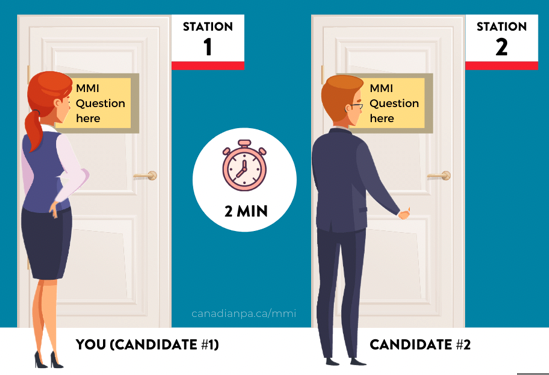The Multiple Mini Interview (MMI) is an interview format used by some medical schools in Australia to assess the personal qualities and non-cognitive skills of applicants. It is a structured interview process that consists of several short stations, each with a different interviewer and scenario. Applicants rotate through these stations, and at each one, they are given a task or question to respond to within a limited time frame.
The MMI format is designed to evaluate a range of non-cognitive attributes, such as communication skills, problem-solving ability, ethical reasoning, and cultural sensitivity, that are important for success in medical practice.
Several medical schools in Australia use the MMI format as part of their admissions process. These include:
- The University of Melbourne
- Monash University
- The University of Western Australia
- The University of Notre Dame Australia
- The University of Queensland
- University of Newcastle and University of New England (JMP)
- Griffith University
It’s worth noting that not all medical schools in Australia use the MMI format, and some may use other types of interviews or assessments to evaluate applicants (such as UNSW).
A key attribute for MMI success is the ability to communicate effectively and clearly. Here are some tips to help you enhance your communication skills:
- Practice active listening: Active listening involves paying attention to what the speaker is saying, asking questions, and providing feedback to show that you understand what they are saying.
- Pay attention to nonverbal communication: Nonverbal communication, such as body language and tone of voice, can convey a lot of information. Pay attention to your own nonverbal cues, as well as those of the person you are communicating with.
- Clarify your message: Be clear and concise when delivering your message. Avoid using jargon or technical terms that may be difficult for the other person to understand.
- Empathize with your audience: Try to understand the other person’s point of view and show empathy. This can help build rapport and improve the quality of your communication.
- Use appropriate language and tone: Use language that is appropriate for the audience and the situation. Be aware of your tone of voice and try to convey your message in a friendly and approachable manner.
- Practice, practice, practice: The more you practice communicating, the more comfortable and confident you will become. Look for opportunities to practice your communication skills, such as public speaking or networking events. This is why Mock interviews with feedback from an experienced tutor will help immensely.
- Seek feedback: Ask for feedback from others on your communication skills. This can help you identify areas for improvement and make adjustments as needed.
Remember, improving communication skills is a lifelong process. By practicing these tips consistently, you can develop stronger communication skills and become a more effective communicator.
Medict provides MMI training and Mock MMI for the specific university of your choice at an exceedingly affordable price. Our tutors are medical students who have a 80%+ interview pass rate and offer holders of various medical schools.
Learn more about our interview courses here: https://medict.com.au/interview/

